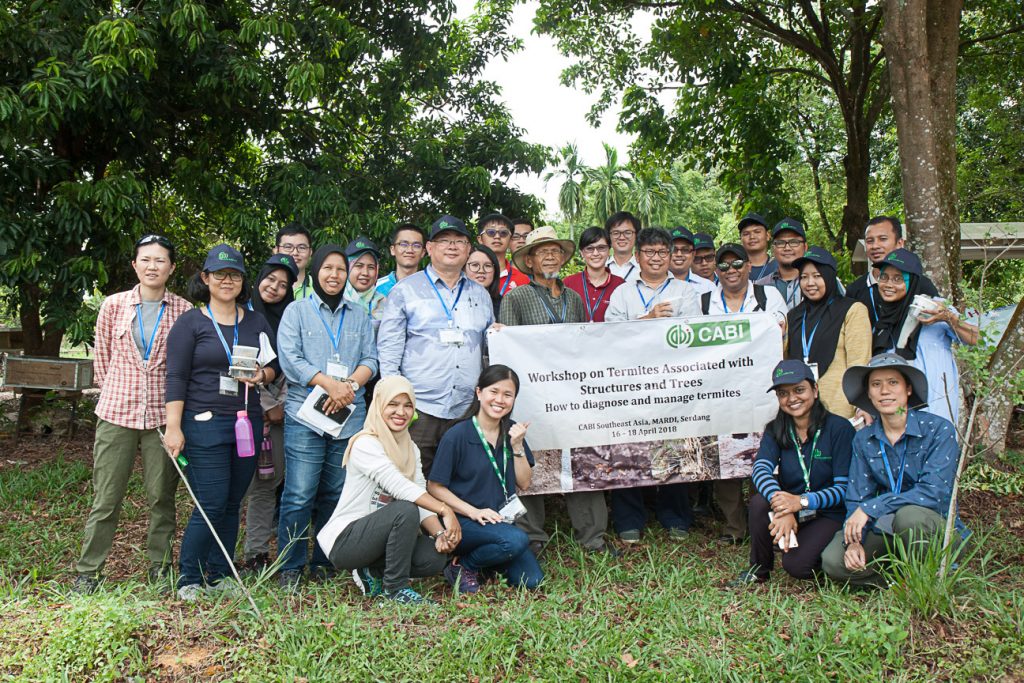Termite workshop photo special – exploring tree-damaging termites in the tropics
CABI scientists have held a successful three-day workshop exploring how to diagnose and manage termites associated with structures and trees in the tropics. The workshop, held at CABI’s South East Asia (SEA) office building at MARDI in Serdang, Malaysia, highlighted termites as ecologically important insects with significant roles to play as decomposers but also as…
One Health and One Welfare for all
By Rebeca Garcia Pinillos “Health for all” has been the guiding vision of the World Health Organisation (WHO) for more than seven decades, underpinning the principle that “all people should be able to realize their right to the highest possible level of health”. This of course includes both health and welfare, terms that are intrinsically…
Women Authors with an Impact – Academic Book Week 2018
2018 marks a hundred years since women were given the right to vote. The implementation of SDG number 5, ‘Gender Equality’, which came into force in 2016 shows how far we have come in our progress towards giving women equal rights a hundred years since. What we now have to show for this call to action is nothing short of a social landmark, with more women in higher paid roles and senior positions, meaning women subsequently have more of a voice in decision-making units. This week we are celebrating our female authors who have proven that we are heading in the right direction towards giving women a voice of authority in some countries.
Cutting plastic bottle use in adventure travel
Earth Day 2018 is on Sunday April 22, and the theme for this year is ending plastic pollution. One of the biggest sources of plastic waste from the general public is single-use plastic bottles, and tourists are a big source of this waste. Even those of us who rarely use disposable drinks bottles when at…
Earth Day 2018 – The campaign to eliminate plastic pollution
[Image credit: Pixabay – hhach] This blog post was written by our new Content Editor – Ellen Baker, ahead of Earth Day on Sunday 22nd April. This year the annual environmental issues awareness event ‘Earth day’ is focussing on the topic of plastic pollution; the problems generated by our high usage of single use plastics…
The story of the rare book on plant diseases that returned ‘home’ to China after a 72 year absence
Photo: The 1942 text by Professor Wang Ming-Chih, returned to China after more than 70 years Lesley Ragab thought she knew CABI’s stock of more than 24,000 books and 2,000 journals like the back of her hand after serving as librarian at the organisation’s Egham, UK, office for over 20 years. That was until she stumbled…
How to Control Urban Pests: Q&A with Entomologist Dr. Partho Dhang
Quick and easy solutions for treating pests with conventional sprays can harm the environment and contaminate surrounding areas, making them unsafe and unfit for solving urban pest problems. We asked CABI author and entomologist, Dr Partho Dhang, for some practical advice on treating these common pests that will be helpful for those whose living spaces are…
Chocolate SDGs unwrapped
“The Sustainable Development Goals (SDGs), otherwise known as the Global Goals, are a universal call to action to end poverty, protect the planet and ensure that all people enjoy peace and prosperity.”1 Should we prioritise chocolate in this universal call to action? Threats to the cocoa industry including low productivity, marketing challenges, pests and disease,…
Universal health coverage: everyone, everywhere…what about cancer?
The World Health Organization is supporting countries moving to universal health coverage and World Health Day, April 7th is part of a year long campaign. WE consider the costs of cancer control in universal health coverage plans, and using cervical cancer as an example the importance of prevention as a cost-effective strategy for low and middle income countries.
Water, tourism and gender – how tourism can increase inequalities. From the work of Dr Stroma Cole
March 22 is World Water Day, designated to focus our attention on the importance of water. The theme for World Water Day 2018 is ‘Nature for Water’ – exploring nature-based solutions to the water challenges we face in the 21st century. But of course water is essential for life, and thus affects every aspect of…




